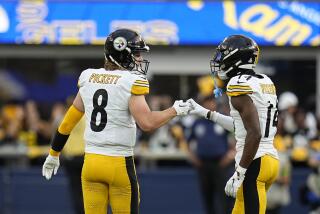Reed Attempts to Put Blown Call Behind Him
- Share via
Rick Reed did not get any threatening phone calls at his New York hotel from irate Red Sox fans Thursday. There were no suspicious-looking room-service meals awaiting the American League umpire.
“Fortunately,” said Reed, who admitted blowing a crucial 10th-inning call that went against Boston in Game 1 Wednesday night, “they don’t know where we stay.”
That didn’t make Thursday any easier for Reed, who on Wednesday turned a potential two-on, no-out threat for the Red Sox into a one-on, one-out situation when he called Jose Offerman out on a force play at second, even though Yankee second baseman Chuck Knoblauch had dropped the ball. Brian Daubach then grounded into a double play.
Bernie Williams homered in the bottom of the 10th for a 4-3 Yankee victory.
“You read newspaper accounts of the play, and some took some potshots at me, called me bumbling . . . those were the nice things,” Reed said. “But that comes with the job.”
Red Sox Manager Jimy Williams said it’s common for NBA and NFL officials to seek help with--and reverse--calls; why couldn’t Wednesday’s umpiring crew do the same thing?
In Game 5 of Boston’s division series against Cleveland, Indian third baseman Travis Fryman hit a ball off the railing above the left-field wall that was initially ruled a double. The umpires conferred and switched the call to a home run.
“An umpire from second base who had a different angle came out and told me the ball hit the rail, so it’s out of the park,” Williams said. “His statement was, ‘I just want to get the play right,’ which, as it turned out, was the right call. You have six umpires who are a team. They should work together.”
Reed said he might have asked for help if it had been a judgment call.
“It happened right in front of me,” Reed said. “If the circumstances were different, if I was blocked out or if it was some crazy play, [another umpire] might have said something. That Cleveland situation was different in that we had a ground rule involved because of the railing on top of the fence.”
There was also a question of whether Reed was in the best position to make the call after John Valentin’s grounder to third.
Williams said, “I don’t know a lot about umpiring, but I do know that the closer you are to a play, the tougher it is to see everything.”
Williams may have a point, Reed conceded.
“As soon as the ball was hit, I took an extra step toward third to get a better perspective,” Reed said. “In doing that, I may have taken my depth perception away. The whole thing with umpiring is timing and angles, and when you don’t have both, you can suffer.”
Reed said he had not been reprimanded by the league for either missing the call or ‘fessing up afterward.
“It’s like a player who makes a mistake,” Reed said. “Is Jimy Williams going to fine [catcher] Jason Varitek for dropping a ball at the plate?”
And, just like a player who seems to get everything hit to him after committing an error, Reed was tested immediately Thursday night. Knoblauch led off the Yankee first with a slow roller to third, and Reed called him out at first, even though replays showed Knoblauch might have been safe.
“It’s part of the game--you’re expected to be right on your first day and get better from there,” Reed said. “I admit I didn’t hold up my end of the bargain [Wednesday night]. . . . Hopefully you learn from your mistakes and move on. I can’t dwell on it.”
More to Read
Go beyond the scoreboard
Get the latest on L.A.'s teams in the daily Sports Report newsletter.
You may occasionally receive promotional content from the Los Angeles Times.











